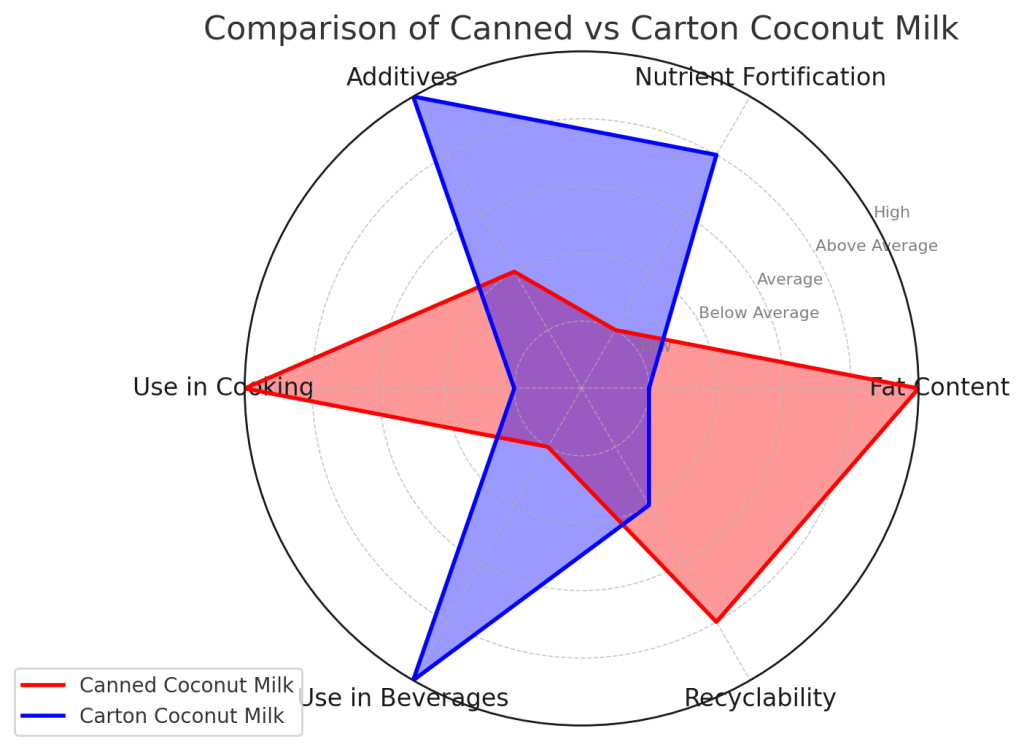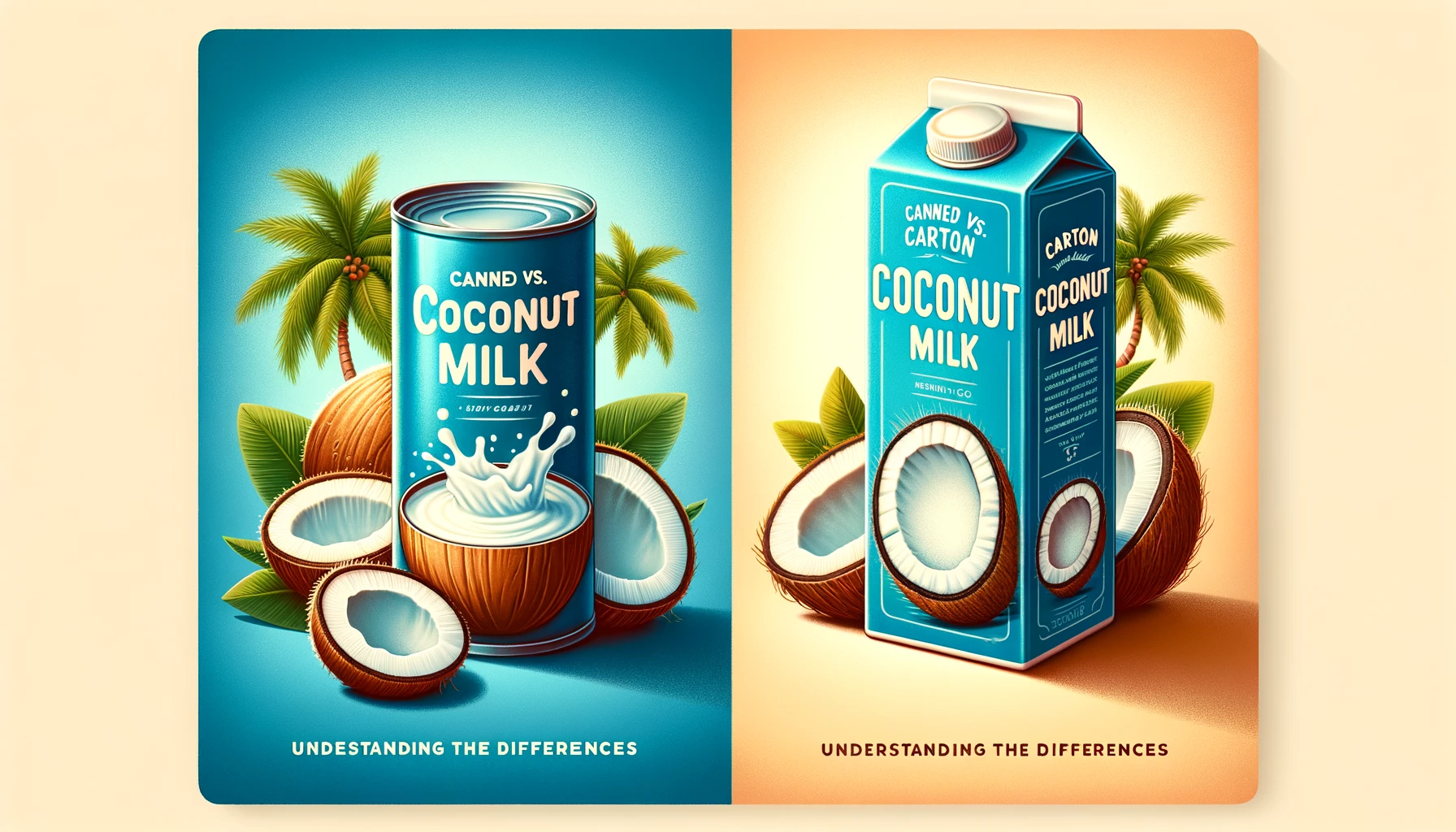Key Takeaways Table
| Key Points | Details |
|---|---|
| Types of Coconut Milk | Canned vs. Carton: Distinct processing and use cases |
| Nutritional Content | Carton coconut milk often fortified with nutrients |
| Additives | Carton coconut milk contains more additives |
| Usage | Canned for cooking and baking, Carton for beverages and cereals |
| Consistency and Taste | Canned is thicker and creamier, Carton is more diluted |
| Fat Content | Higher in canned coconut milk compared to carton |
Understanding the Difference Between Canned and Carton Coconut Milk
Overview
Coconut milk, derived from the meat of the coconut, is available in two primary forms: canned and carton. While both start with coconut and water, significant differences exist in their processing, consistency, nutritional content, and culinary uses.
Nutritional Content and Additives
Carton coconut milk is often fortified with additional nutrients like calcium and vitamin D, making it more akin to cow’s milk and other milk substitutes. This version is also typically more diluted, with additives such as stabilizers, guar gum, or even brown rice, to improve its texture and shelf life.
Usage
Canned coconut milk, containing around 90% whole coconut extract, is primarily used in cooking and baking. Its rich, creamy texture makes it ideal for adding depth and flavor to dishes. In contrast, carton coconut milk, with its lower fat content and added water, is more commonly used as a non-dairy milk alternative in cereals, puddings, smoothies, and drinks.
Consistency and Taste
One of the most notable differences is in their consistency and taste. Canned coconut milk is less diluted, giving it a thicker consistency and a more nuanced flavor profile. Carton coconut milk, on the other hand, is significantly more diluted, resulting in a thinner consistency and a different taste experience.
Fat Content
Canned coconut milk has a higher fat content, contributing to its thicker, creamier texture. Carton coconut milk, due to added water and fillers, is much lower in fat content.
Comparing Canned and Carton Coconut Milk
| Feature | Canned Coconut Milk | Carton Coconut Milk |
|---|---|---|
| Primary Use | Cooking and baking | Dairy-free milk alternative |
| Nutritional Content | Higher fat, less water | Fortified, more diluted |
| Additives | Fewer additives | More additives (stabilizers, etc.) |
| Consistency | Thicker and creamier | Thinner and more liquid |
| Culinary Uses | Curries, desserts, sauces | Beverages, cereals, smoothies |
Health Benefits and Considerations
Health Aspects of Coconut Milk
Both canned and carton coconut milk offer health benefits, but their nutritional profiles differ significantly due to their varying fat contents and additives. Canned coconut milk, being richer in fats, is a good source of energy and beneficial fats. On the other hand, carton coconut milk, often fortified, can provide additional nutrients that are not naturally present in coconut milk, such as calcium and vitamin D.
Dietary Considerations
For those on specific diets, like keto or paleo, canned coconut milk is often more suitable due to its higher fat content and fewer additives. However, for individuals looking for a lower-calorie, lower-fat option, especially for everyday use in beverages and cereals, carton coconut milk is the better choice.

Environmental and Sustainability Factors
Packaging and Sustainability
The environmental impact of the packaging should also be considered. Canned coconut milk often comes in metal cans, which are widely recyclable, whereas cartons can be a mix of paper, plastic, and sometimes metal, making them harder to recycle. The choice between canned and carton coconut milk can also be influenced by these environmental considerations.
Sourcing and Ethical Practices
It’s also important to consider the sourcing of the coconut milk. Ethical practices in sourcing, such as fair trade and sustainable farming, are crucial for environmental sustainability and the well-being of farmers. Consumers are increasingly looking for products that align with these values.
FAQs on Coconut Milk
- Is canned coconut milk better than carton coconut milk?
- It depends on your use case. Canned is better for cooking and richness, while carton is more suitable for drinking and as a milk substitute.
- Can I substitute carton coconut milk for canned in recipes?
- Substitution depends on the recipe. For dishes requiring thickness and richness, canned is preferred. In lighter recipes, carton coconut milk can be used.
- Are there any health risks associated with coconut milk?
- Coconut milk is generally safe, but its high saturated fat content, especially in canned form, should be consumed in moderation.
Related Articles
- Discover more about the shelf life of this versatile ingredient in How Long Does Canned Coconut Milk Last?
- Learn how to identify spoilage with How to Tell if Canned Coconut Milk is Bad
- Get tips on preservation with How to Store Canned Coconut Milk After Opening
- Enhance your baking with How to Make Canned Coconut Pecan Frosting Better
- Solve common issues in Why is My Canned Coconut Milk Solid?
Conclusion
Understanding the differences between canned and carton coconut milk is crucial for culinary applications. Each type serves a distinct purpose in the kitchen, and knowing their unique properties can enhance the flavor and quality of your dishes.
For more insights on coconut milk, explore our related articles:

